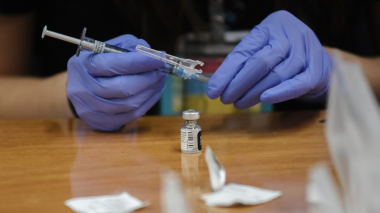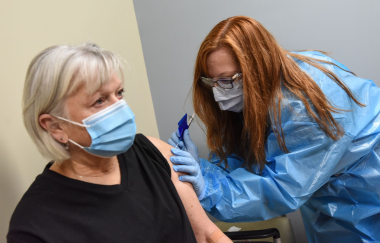Editor's note: This information is current as of September 28, 2021. COVID-19 and the way health professionals may treat it - along with any variants - may change as we learn more, as we are still in the infancy of studies on COVID-19.
Whether your symptoms are mild or severe, COVID-19 patients have many treatment options available to help them overcome the virus. For more serious cases where patients need to be admitted to the hospital, doctors recommend several drug treatments that are either fully approved or authorized for emergency use by the FDA. Also, patients may choose to take part in therapies that are currently being tested in clinical trials. These therapies test whether treatments are safe and effective in fighting COVID-19.
Here's a closer look at some of the available COVID-19 treatments, with extra information from Christopher Polk, MD, an Atrium Health infectious disease physician.
If you have COVID-19, talk to your health care provider about the available treatment that’s best based on your symptoms, risks, and health history.
Remdesivir
What is it? Remdesivir is an antiviral drug that was originally developed as a treatment for Ebola. However, it can also work against other viruses including COVID-19.
It is FDA approved? The FDA has fully approved remdesivir for adults and pediatric patients ages 12 and older who are sick enough to be admitted to the hospital for COVID-19.
Who is it recommended for? Remdesivir is recommended for COVID patients admitted to the hospital who need to be given oxygen. This sometimes is used in along with dexamethasone.
“Treatment of COVID-19 in the hospital typically includes remdesivir if patients are still within 10 days of symptom onset and overall side effects of the drug appear to be low,” says Dr. Polk.
Dr. Polk served as the Principal Investigator for a clinical trial evaluating use of remdesivir. Atrium Health was the Charlotte region’s first healthcare systems to offer remdesivir.
Anticoagulants
What is it? Anticoagulants, often known as “blood thinners,” are medicines that help to prevent blood clots. Blood clots are concerning because COVID-19 can cause severe inflammation. This can trigger your clotting system and heighten the risk of getting a blood clot – which can at times travel to the lungs and become a life-threatening medical problem.
It is FDA approved? There are many different approved anticoagulants used in patients admitted to the hospital. However, heparin or low molecular weight heparins such as enoxaparin are used.
Who is it recommended for? These drugs are used to help prevent blood clots for almost all COVID patients admitted to the hospital.
Dexamethasone
What is it?: Dexamethasone is a corticosteroid (steroid). It is an anti-inflammatory medicine. It was tested in patients with COVID-19 admitted to the hospital in the RECOVERY trial. This is a very large clinical trial of COVID-19 treatments in the United Kingdom. It was found to improve survival of patients who needed oxygen therapy.
Is it FDA approved?: Dexamethasone has been used and approved for many purposes as a medicine since the 1950s.
Who is it recommended for?: Dexamethasone is recommended for COVID-19 patients admitted to the hospital who need supplemental oxygen. It is sometimes used along with remdesivir – another COVID-19 treatment option for patients admitted to the hospital. If dexamethasone is not available, other steroids can be used. These steroids include prednisone, methylprednisolone, or hydrocortisone.
“We use dexamethasone, which reduces lung inflammation, for patients who require oxygen,” says Dr. Polk. “And for some patients we also use tocilizumab or or baricitinib as additional medications that decrease inflammation in the lungs if patients do not initially respond to dexamethasone therapy.”
Tocilizumab
What is it?: Tocilizumab helps reduce lung inflammation, particularly in severe COVID-19 disease.
Is it FDA approved?: The FDA has issued an emergency use authorization (EUA) for tocilizumab. This is the same type of authorization as other COVID-19 vaccines. With this, clinicians can use the drug to treat patients if patients agree to it. If you qualify to get tocilizumab your doctor will talk with you about this medicine and ask for your consent to get it. This is like other medicines prescribed in the hospital.
Who is it recommended for?: Tocilizumab is recommended for COVID-19 patients admitted to the hospital with severe disease who need large amounts of extra oxygen.
“We use tocilizumab in a subset of very ill hospitalized patients in addition to dexamethasone” says Dr. Polk.
Baricitinib
What is it?: Like tocilizumab, baricitinib helps decrease lung inflammation in severe COVID-19.
Is it FDA approved?:
The FDA has issued an emergency use authorization (EUA) for baricitinib as well. If you qualify to get baricitinib your doctor will talk with you about it and ask for your consent to receive it.
Who is it recommended for?: Baricitinib is recommended for COVID-19 patients admitted to the hospital with severe disease who need large amounts of extra oxygen.
Monoclonal Antibody Treatments (mAb)
What is it? This is a very promising treatment. It uses monoclonal antibodies (lab-created proteins that act like antibodies) to neutralize (or disarm) the COVID-19 virus from causing more infection. The treatment is given through an IV, allowing the medicine to go directly into a patient’s bloodstream.
It is FDA approved?: The FDA has issued emergency use authorization (EUAs) for several monoclonal antibody treatments – for the treatment of mild or moderate COVID-19 in adults and some pediatric patients. These include antibody drugs, such as:
- REGEN-COV
- Bamlanivimab
- Etesevimab
- Sotrovimab
Who is it recommended for? Anyone who is at significant risk for getting severe COVID-19 qualifies for therapy. There are many medical conditions that can qualify a patient for monoclonal antibodies. These include being overweight, having diabetes, being over the age of 65, and being pregnant. The treatment is also only available by physician referral to those ages 12 and older. It must be given within 7 to 10 days of when symptoms start for it to be effective.
“This is the only treatment that the FDA has authorized for people outside of the hospital,” Dr. Polk says. “Antibodies generally are not used after you’re admitted to the hospital. The other treatments discussed previously are used.”
The one-time mAb treatment has been shown to help keep COVID-19 from getting worse that might otherwise require a patient to be admitted to the hospital. The lab-created proteins act like normal antibodies in neutralizing the virus from causing more infection. Studies found that when patients who were symptomatic with COVID-19 received mAb treatment, the amount of time they visited the hospital or an emergency room decreased by 70% (7 out of 10 times).
“The likelihood of getting hospitalized decreases significantly if you’re treated within the first seven days of infection,” Dr. Polk says. "People can access that treatment through their primary care doctor or urgent care if they meet the criteria of risk factors for progression to severe COVID disease and are within 7 days of symptom onset.”
What should NOT be used as treatments?
Dr. Polk shares that several treatments have been promoted and used and have drawn popular interest, despite the lack of data to suggest the treatments are helpful.
“There have been multiple medications that have been used off-label or studied in an attempt to treat COVID-19,” he says. “These include hydroxychloroquine, ivermectin, and colchicine. There were a few preliminary studies for some of these treatments outside the hospital, but multiple studies show no data that the treatments help.”
- ❌ Hydroxychloroquine – FDA-approved to treat or prevent malaria and treat autoimmune conditions such as lupus and rheumatoid arthritis.
- It is NOT approved to treat COVID-19. Dr. Polk says “multiple large, well designed studies and our own clinical experience early in the pandemic found hydroxychloroquine to be ineffective in treating COVID-19”.
- ❌ Ivermectin – FDA-approved to treat people with intestinal parasites or worms. In addition, some topical forms of ivermectin are approved to treat external parasites like head lice or scabies.
- It is NOT approved to treat COVID-19. Current data does not show ivermectin is effective against COVID-19. A panel of Atrium Health physician experts has reviewed all studies examining using Ivermectin to treat COVID-19 and found no evidence of efficacy, noting that in the studies suggesting benefit there were major flaws or limitations in the study. One study even included false data so we cannot trust results of these studies. National treatment guidelines from the National Institute of Health also do not recommend use of Ivermectin for treatment of COVID-19.
- Polk has noticed a particular rise in questions about ivermectin, which the FDA approved for human use as an antiparasitic drug in 1996. The FDA warns against the drug’s use for treating COVID-19. “Multiple studies have looked at ivermectin and the consensus of infectious disease physicians is that it is not helpful in treating COVID-19.”
- ❌ Cochichine – FDA-approved anti-inflammatory drug to treat a variety of conditions including gout.
- It is NOT approved to treat COVID-19. Clinical trials on the drug’s potential benefit for COVID-19 are underway, but the NIH Treatment Guidelines panel currently does not recommend the use of colchicine.
Treatment improves as knowledge grows
The best way to curb further spread of COVID-19 and the Delta variant is getting vaccinated. Other improvements in fighting COVID-19 since the pandemic started came as researchers learned more about medical treatments and adjusted their efforts to fight the virus.
“At the beginning of the pandemic we had little to offer patients,” Dr. Polk says. “Now we know that our treatments with steroids and other anti-inflammatory drugs and antivirals do help,” he says. “And monoclonal antibodies help people stay out of the hospital. We’ve really come a long way.”
Dr. Polk says even with these treatments it’s vital for everyone to get vaccinated. Yet, given the current strain on our hospital system due to a large volume of COVID-19 patients, it is even more important to get vaccinated. Vaccines are the best protection against severe COVID-19 illness. This includes patients who have had COVID-19 and recovered but have not been vaccinated yet.
“We know that folks who’ve had COVID-19 aren’t necessarily protected from getting re-infected,” Dr. Polk says. “Vaccines help you make additional antibodies and make you more protected from future infection. That’s another reason it’s so important to get vaccinated.”
Learn more about the vaccine and where to schedule your vaccination.



